Unit2 Healthy eating-Learning about language 课件(48张)
文档属性
| 名称 | Unit2 Healthy eating-Learning about language 课件(48张) | 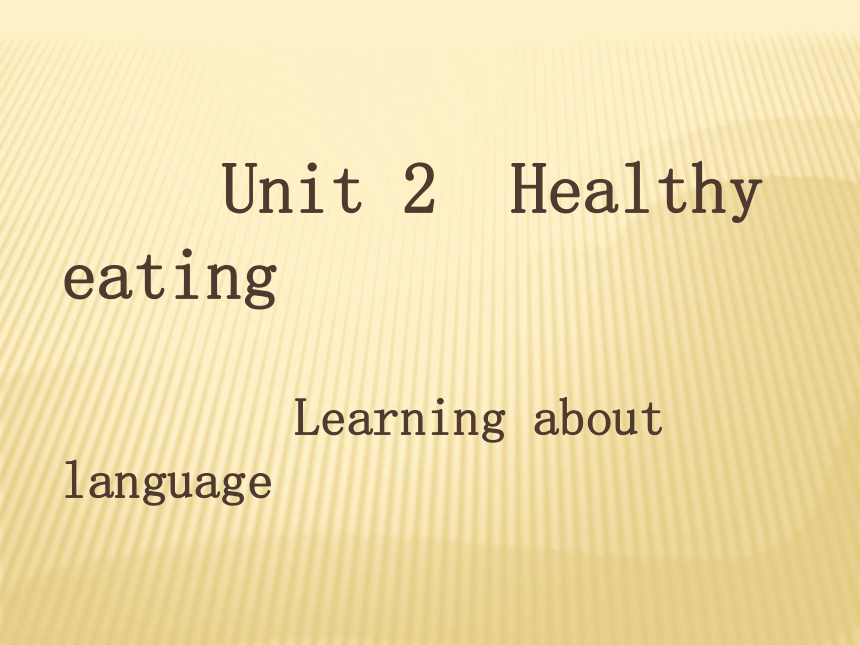 | |
| 格式 | zip | ||
| 文件大小 | 1.6MB | ||
| 资源类型 | 教案 | ||
| 版本资源 | 人教版(新课程标准) | ||
| 科目 | 英语 | ||
| 更新时间 | 2018-07-18 10:26:56 | ||
图片预览

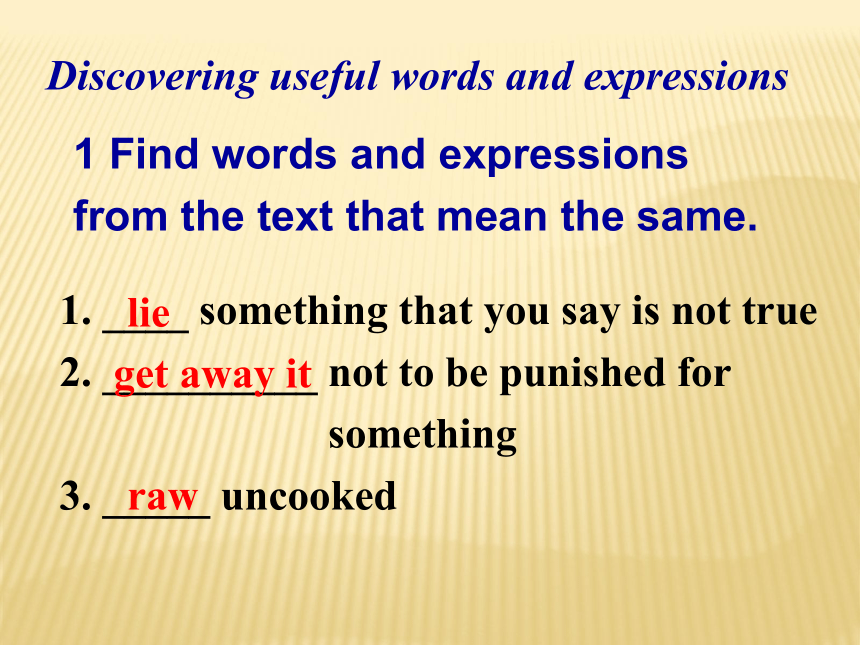
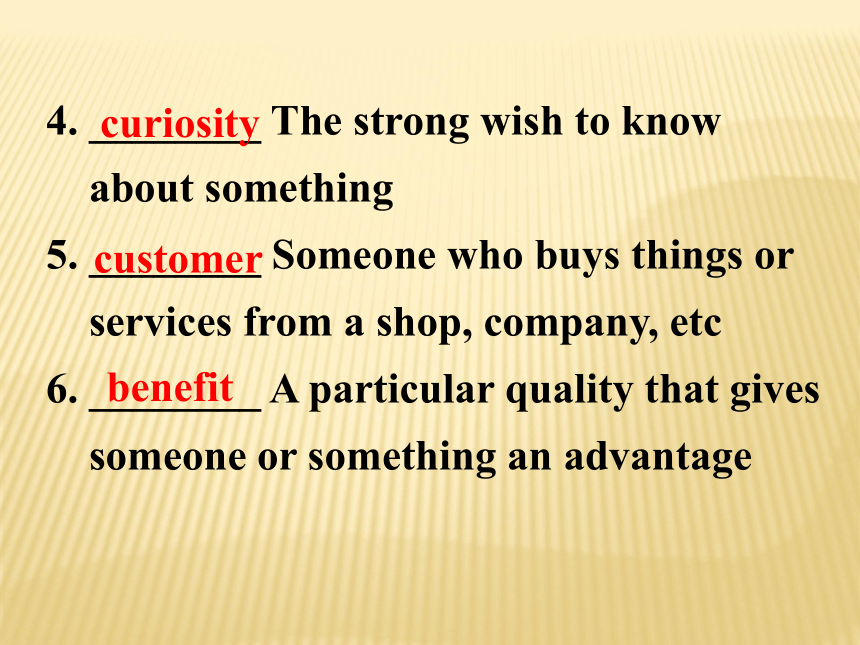
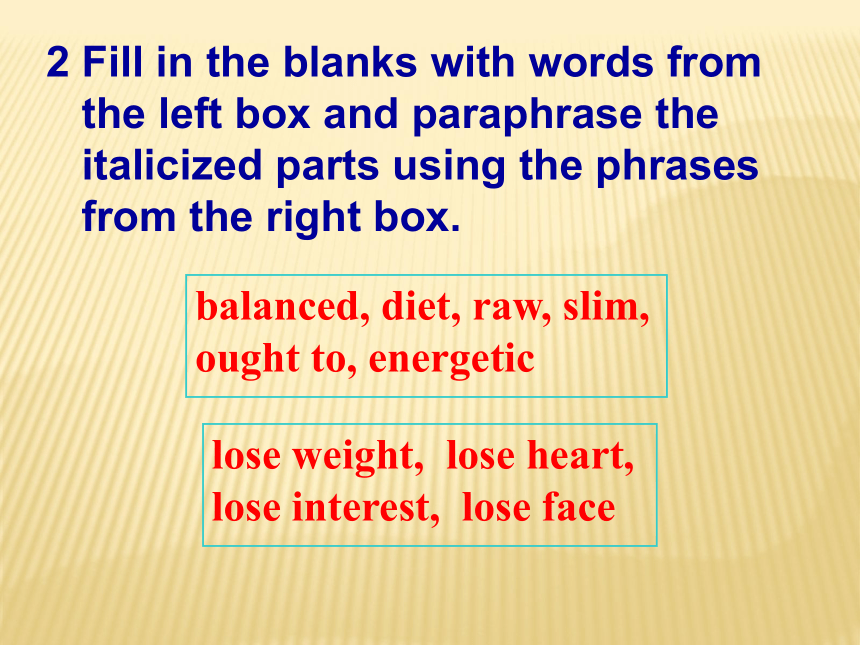
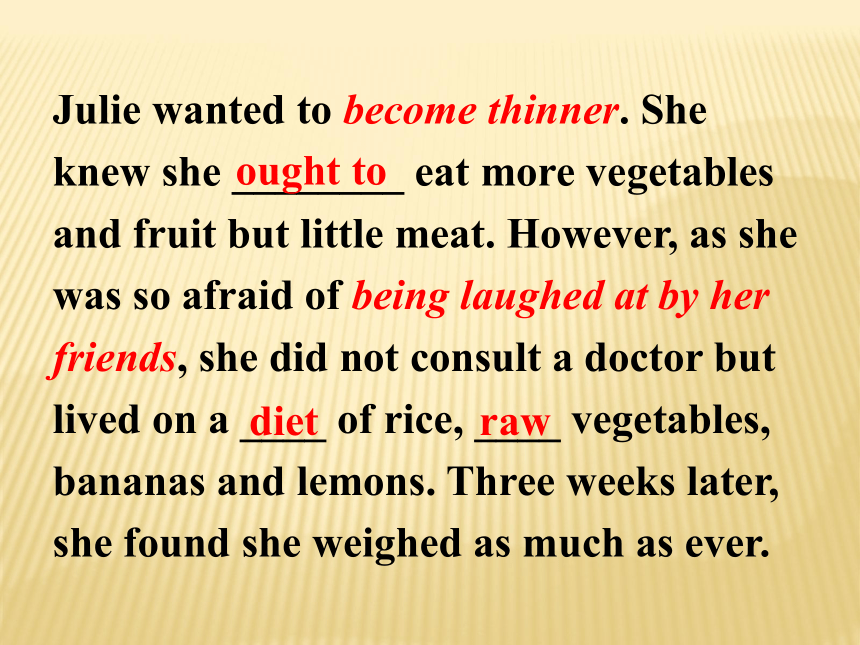
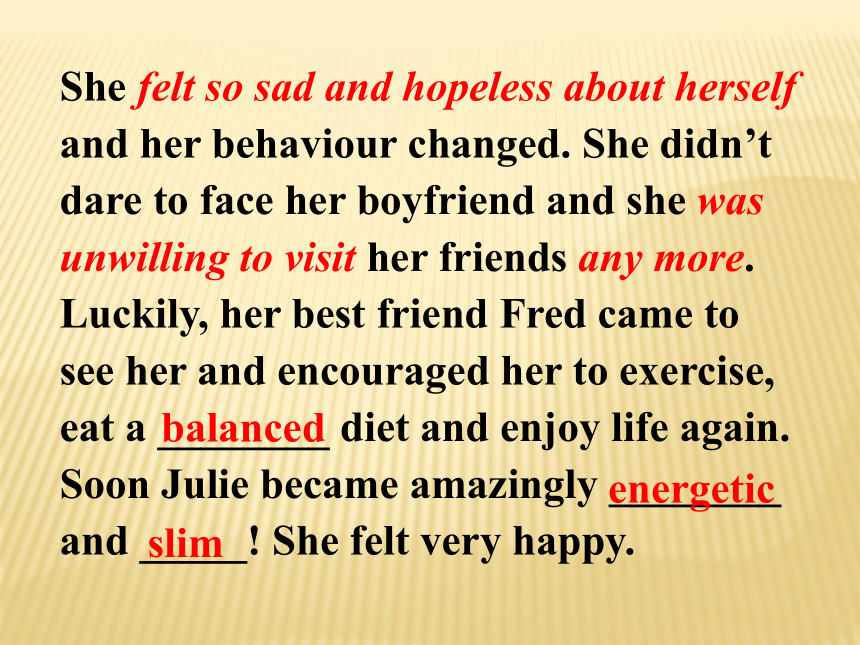
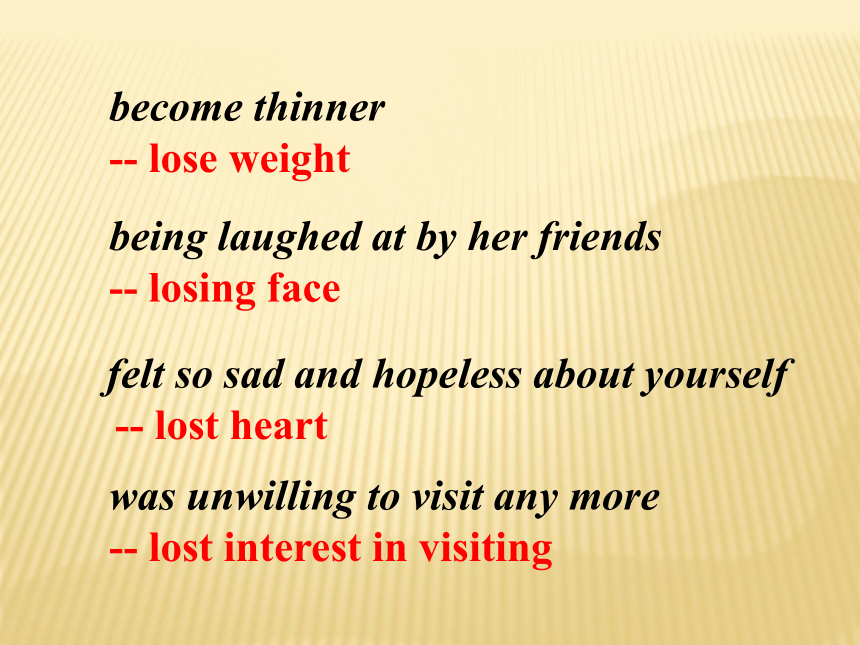
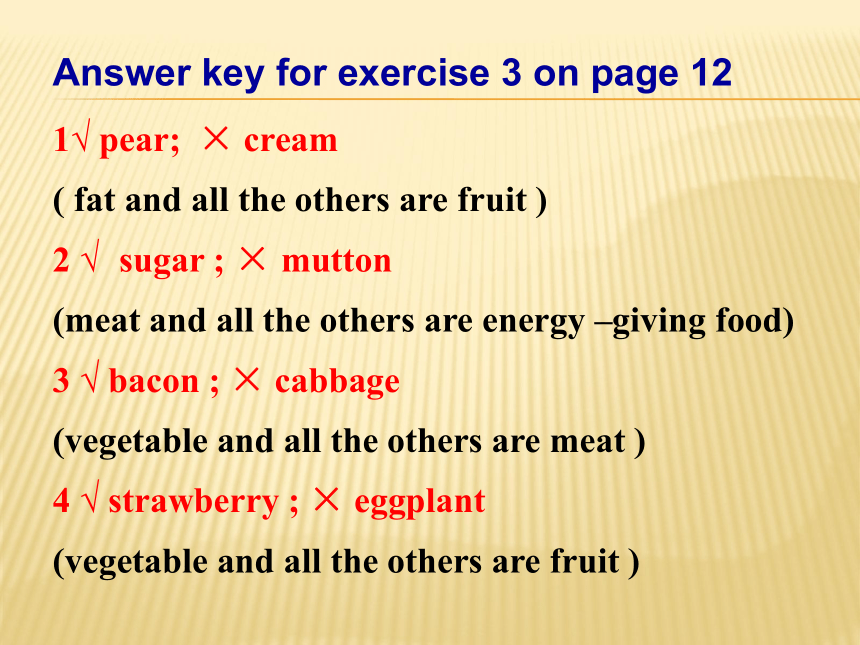
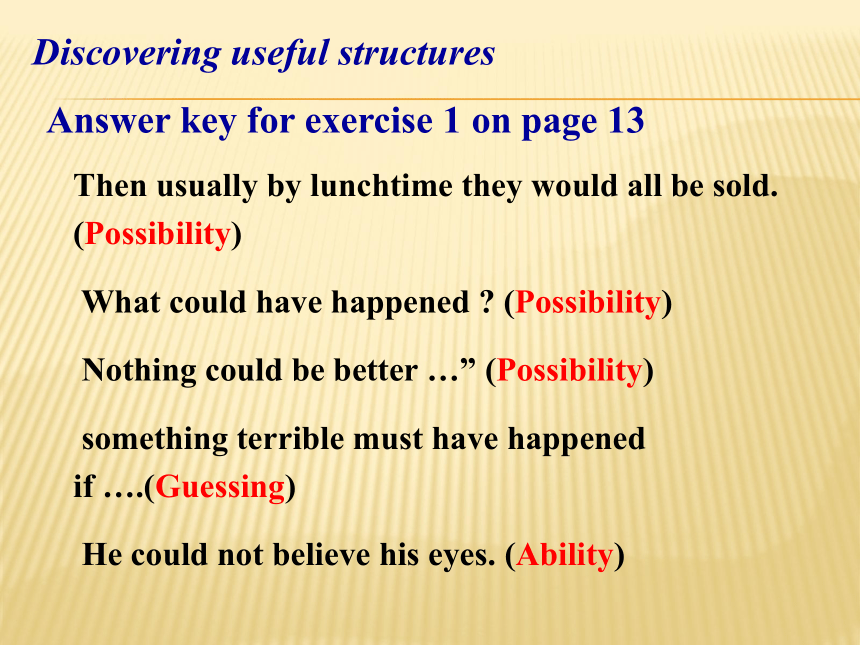
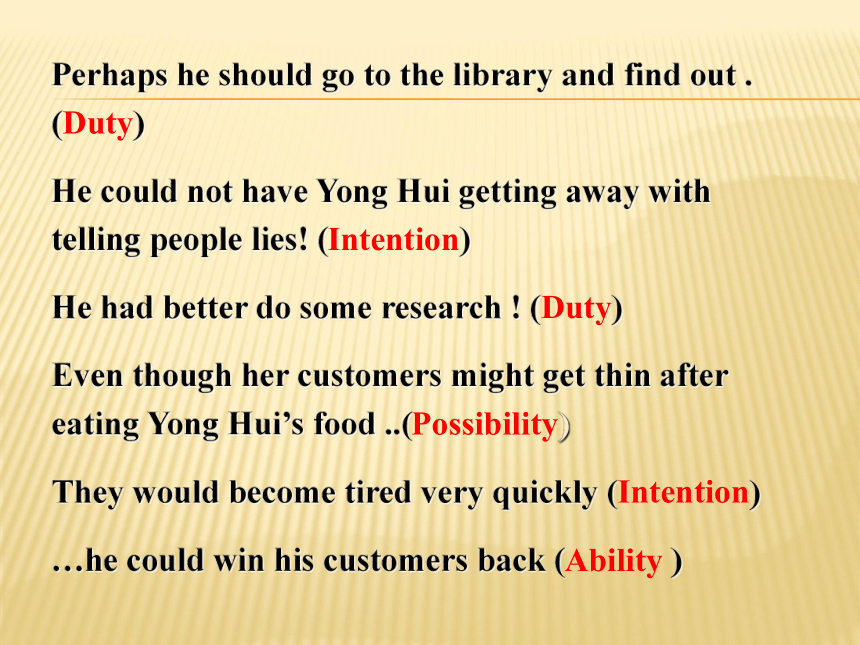
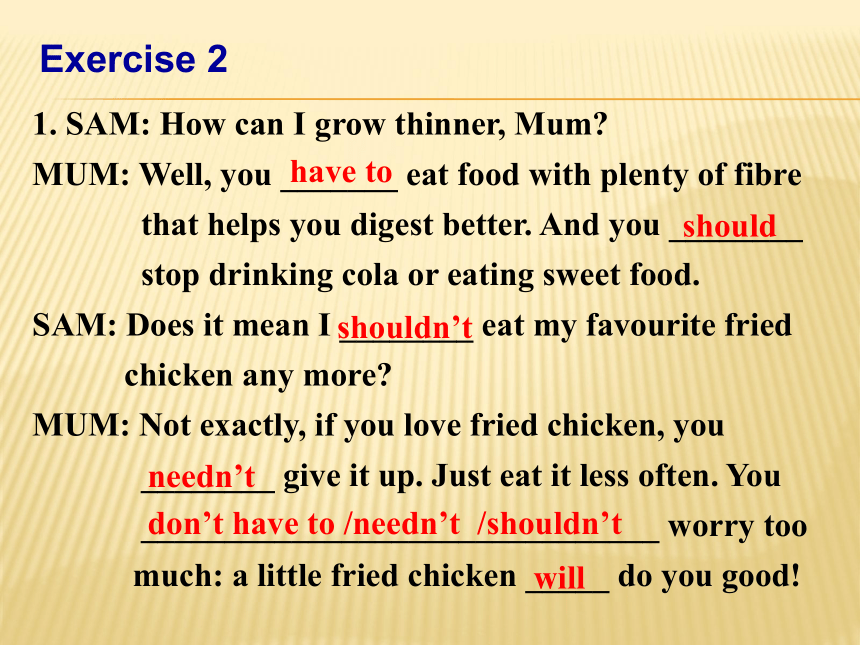
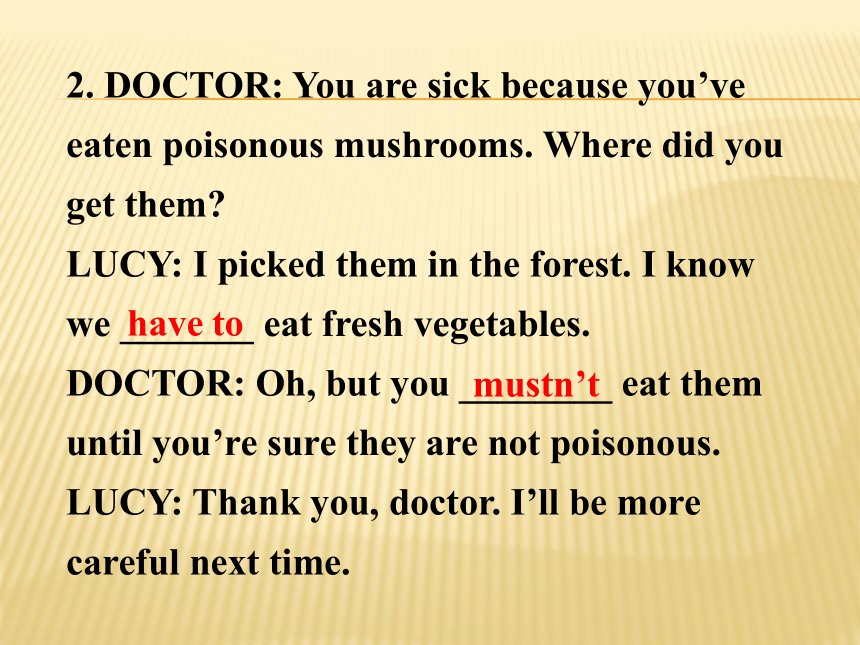
文档简介
课件48张PPT。 Unit 2 Healthy eating
Learning about language ____ something that you say is not true
2. __________ not to be punished for
something
3. _____ uncookedlie get away it rawDiscovering useful words and expressions 1 Find words and expressions
from the text that mean the same.4. ________ The strong wish to know
about something
5. ________ Someone who buys things or
services from a shop, company, etc
6. ________ A particular quality that gives
someone or something an advantagecuriositycustomerbenefit balanced, diet, raw, slim,
ought to, energetic lose weight, lose heart,
lose interest, lose face2 Fill in the blanks with words from
the left box and paraphrase the
italicized parts using the phrases
from the right box.Julie wanted to become thinner. She knew she ________ eat more vegetables and fruit but little meat. However, as she was so afraid of being laughed at by her friends, she did not consult a doctor but lived on a ____ of rice, ____ vegetables, bananas and lemons. Three weeks later, she found she weighed as much as ever. ought to dietrawShe felt so sad and hopeless about herself and her behaviour changed. She didn’t dare to face her boyfriend and she was unwilling to visit her friends any more. Luckily, her best friend Fred came to see her and encouraged her to exercise, eat a ________ diet and enjoy life again. Soon Julie became amazingly ________ and _____! She felt very happy.balanced energeticslimbecome thinner
-- lose weight being laughed at by her friends
-- losing face felt so sad and hopeless about yourself
-- lost heartwas unwilling to visit any more
-- lost interest in visiting1√ pear; × cream
( fat and all the others are fruit )
2 √ sugar ; × mutton
(meat and all the others are energy –giving food)
3 √ bacon ; × cabbage
(vegetable and all the others are meat )
4 √ strawberry ; × eggplant
(vegetable and all the others are fruit )Answer key for exercise 3 on page 12Answer key for exercise 1 on page 13Then usually by lunchtime they would all be sold. (Possibility)
What could have happened ? (Possibility)
Nothing could be better …” (Possibility)
something terrible must have happened if ….(Guessing)
He could not believe his eyes. (Ability)Discovering useful structures Perhaps he should go to the library and find out . (Duty)
He could not have Yong Hui getting away with telling people lies! (Intention)
He had better do some research ! (Duty)
Even though her customers might get thin after eating Yong Hui’s food ..(Possibility)
They would become tired very quickly (Intention)
…he could win his customers back (Ability )1. SAM: How can I grow thinner, Mum?
MUM: Well, you _______ eat food with plenty of fibre
that helps you digest better. And you ________
stop drinking cola or eating sweet food.
SAM: Does it mean I ________ eat my favourite fried
chicken any more?
MUM: Not exactly, if you love fried chicken, you
________ give it up. Just eat it less often. You
_______________________________ worry too
much: a little fried chicken _____ do you good!have to shouldshouldn’t needn’t willdon’t have to /needn’t /shouldn’t Exercise 22. DOCTOR: You are sick because you’ve
eaten poisonous mushrooms. Where did you
get them?
LUCY: I picked them in the forest. I know
we _______ eat fresh vegetables.
DOCTOR: Oh, but you ________ eat them
until you’re sure they are not poisonous.
LUCY: Thank you, doctor. I’ll be more
careful next time.have to mustn’t 3. CHARLES: I wish I could see things clearly
in the dark.
TOM: Eating carrots ________ help you see
better. You ________ eat some every day.ought to should GrammarModal verbs情态动词(二)should 和ought to 都为“应该”的意思,
可用于各种人称。ought to 的语气
稍重一些。
他们想必已到那儿了。
They ought to be there by now.
他最好不要抽烟了。
He ought to stop smoking. 1. ought to/should should表示主语的义务或责任:
You should take care of your sister.
你应当去照顾你妹妹。
或指出一个正确、明智的动作:
They shouldn‘t allow parking here;
the street is too narrow.
这儿不该允许停车; 马路太窄了。should 和ought to后面跟动词不定式的
完成式, 其肯定句表示”过去应该做而未做”,
其否定句则表示”过去不该做但做了”。
You should/ought to have made the decision
a week ago.
I shouldn't have made such a foolish mistake.
多数情况下, ought to 可与should互换使用。
ought to的反意疑问句用shouldn’t替代。注意You ought to have helped him with his English, ____ you ?
A. won’t you
B. ought not you
C. shouldn’t you
D. wouldn’t youC三者均表示建议, 意为“应该”, “应当”或
“最好做…”。三者的语气程度为渐强。
had better指一般性的建议, 最弱。
should&ought to含义相近, 常可互换。
区别在于, ought to常指特殊情况下的
“应当”。should则指一般情况。如:had better, should & ought toshall用于第一, 三人称的疑问句中, 表征求
意见或请求;
用于第二, 三人称的陈述句中,表命令,警告,
允诺, 威胁等;
should 表劝告, 建议, 命令, 顺理成章的,
和ought to一样。
疑问句中常用should代替ought to。
ought to 表应该, 语气比should强。shall, should &ought toYou ought to help him because he is in trouble now. (语气强, 有命令意味)
You should have a rest after finishing your sports. (一般性建议)
You ought to call the police when you find something wrong in your house.
He should take care of the babies tonight. have to 表示客观需要去做的事情,
意为“必须, 不得不” 。
I have to get the station early to catch
the first train.
We missed the bus so we had to walk home.
We have to overcome all kinds of
difficulties.2. have tohave to 有多种时态:
We will have to gather at the school gate
at 7 tomorrow. 一般将来时
I have to take more money with me
because my girlfriend has so much to buy.
一般现在时
Finally, we had to give up our idea to
hold a picnic outside as it rained for a
whole afternoon. 一般过去时--Must they do their homework now?
--Yes, they must.
--No, they needn’t/don’t have to. must用于疑问句询问对方是否认为
主语必须做某事; 肯定回答可以用
must, 否定回答不能用mustn’t, 常用
don’t have to 或 needn’t。must & have toneed用于否定句、疑问句或条件句中,
needn’t表示“没必要”, needn’t have
done表示过去本来不必做而实际上做
了的事。3. need注意对need问句的回答:
--Need I finish the work today?
--Yes, ________________.
No, ________________.
No, ________________.you mustyou needn’tyou don’t have to用下列图片造句。做适当的运动 You should do some sports. 慢慢地进食, 并有助消化。 You ought to eat slowly and it’s good for digestion. You should help to set the dinner table. You should keep your room clean.We must listen to the teacher carefully.We mustn’t eat in class.You ought to hand on the homework on time.You shouldn’t be late for school.We should ask question actively.We shouldn’t make noise in class.Make sentences. 1. 你每天最少要练习一小时口语。
You must practise speaking English
at least an hour a day.
2. 我每天不得不练习一小时口语!
I have to practise speaking English
an hour a day! 3. 你应该每天练习不止一小时。
You ought to/should practice
English for more than an hour.
4. 你应该读一下这个。它写得很好。
You ought to/should read this.
It’s very good.
5. 你必须读这个。写得精彩极了!
You must read this. It's marvelous!1. I thought you ___ like something to read,
so I have brought you some books.
A. may B. might
C. would D. must
2. Where is my pen? I ____it.
A. might lose B. would have lost
C. should have lost D. must have lostB D 考题专练3. I didn’t hear the phone. I ___ asleep
A. must be B. must have been
C. should be D. should have been
4. It’s nearly seven o’clock . Jack ___ be
here at any moment.
A. must B. need
C. should D. couldB C5. --There were already five people in the
car, but they managed to take me as well.
--It ____ a comfortable journey.
A. can’t be
B. shouldn’t be
C. mustn’t have been
D. couldn’t have been
D 6. --Did the train arrive in time?
--No. It ____ two hours ago.
A. must have arrived
B. ought to have arrived
C. must arrive
D. ought to arriveB 7. --Must I drive to his house and pick
up the children?” ?
-- No, ______.” ? A. you shouldn't?
B. you might not ?
C. you needn't ?
D. you mustn'tC 8. We didn't see Tom at the meeting
yesterday. He _____ it. ? A. mustn't have attended?
B. can not have attended ? C. needn't have attended?
D. would have not attendedB 9. You ____ such a long composition.
The teacher only asked for 300 words.
You have written 600.
A. mustn’t have written
B. couldn’t have written
C. needn’t have written
D. do not have to writeC 10. There is someone knocking at the
door. _____ it be Tom? ? A. can? B. must? C. should? D. ought to
11. Two years ago, my husband bought
me a bicycle. If you live in town, it is
often faster than a car and you _____
worry about parking.
?? A. must not?? B. may not?
C. should not?? D. don't have toA D Homework1. Preview the reading (2) and see how
the story ended.
2. Finish the exercises on Page 49-50.
Learning about language ____ something that you say is not true
2. __________ not to be punished for
something
3. _____ uncookedlie get away it rawDiscovering useful words and expressions 1 Find words and expressions
from the text that mean the same.4. ________ The strong wish to know
about something
5. ________ Someone who buys things or
services from a shop, company, etc
6. ________ A particular quality that gives
someone or something an advantagecuriositycustomerbenefit balanced, diet, raw, slim,
ought to, energetic lose weight, lose heart,
lose interest, lose face2 Fill in the blanks with words from
the left box and paraphrase the
italicized parts using the phrases
from the right box.Julie wanted to become thinner. She knew she ________ eat more vegetables and fruit but little meat. However, as she was so afraid of being laughed at by her friends, she did not consult a doctor but lived on a ____ of rice, ____ vegetables, bananas and lemons. Three weeks later, she found she weighed as much as ever. ought to dietrawShe felt so sad and hopeless about herself and her behaviour changed. She didn’t dare to face her boyfriend and she was unwilling to visit her friends any more. Luckily, her best friend Fred came to see her and encouraged her to exercise, eat a ________ diet and enjoy life again. Soon Julie became amazingly ________ and _____! She felt very happy.balanced energeticslimbecome thinner
-- lose weight being laughed at by her friends
-- losing face felt so sad and hopeless about yourself
-- lost heartwas unwilling to visit any more
-- lost interest in visiting1√ pear; × cream
( fat and all the others are fruit )
2 √ sugar ; × mutton
(meat and all the others are energy –giving food)
3 √ bacon ; × cabbage
(vegetable and all the others are meat )
4 √ strawberry ; × eggplant
(vegetable and all the others are fruit )Answer key for exercise 3 on page 12Answer key for exercise 1 on page 13Then usually by lunchtime they would all be sold. (Possibility)
What could have happened ? (Possibility)
Nothing could be better …” (Possibility)
something terrible must have happened if ….(Guessing)
He could not believe his eyes. (Ability)Discovering useful structures Perhaps he should go to the library and find out . (Duty)
He could not have Yong Hui getting away with telling people lies! (Intention)
He had better do some research ! (Duty)
Even though her customers might get thin after eating Yong Hui’s food ..(Possibility)
They would become tired very quickly (Intention)
…he could win his customers back (Ability )1. SAM: How can I grow thinner, Mum?
MUM: Well, you _______ eat food with plenty of fibre
that helps you digest better. And you ________
stop drinking cola or eating sweet food.
SAM: Does it mean I ________ eat my favourite fried
chicken any more?
MUM: Not exactly, if you love fried chicken, you
________ give it up. Just eat it less often. You
_______________________________ worry too
much: a little fried chicken _____ do you good!have to shouldshouldn’t needn’t willdon’t have to /needn’t /shouldn’t Exercise 22. DOCTOR: You are sick because you’ve
eaten poisonous mushrooms. Where did you
get them?
LUCY: I picked them in the forest. I know
we _______ eat fresh vegetables.
DOCTOR: Oh, but you ________ eat them
until you’re sure they are not poisonous.
LUCY: Thank you, doctor. I’ll be more
careful next time.have to mustn’t 3. CHARLES: I wish I could see things clearly
in the dark.
TOM: Eating carrots ________ help you see
better. You ________ eat some every day.ought to should GrammarModal verbs情态动词(二)should 和ought to 都为“应该”的意思,
可用于各种人称。ought to 的语气
稍重一些。
他们想必已到那儿了。
They ought to be there by now.
他最好不要抽烟了。
He ought to stop smoking. 1. ought to/should should表示主语的义务或责任:
You should take care of your sister.
你应当去照顾你妹妹。
或指出一个正确、明智的动作:
They shouldn‘t allow parking here;
the street is too narrow.
这儿不该允许停车; 马路太窄了。should 和ought to后面跟动词不定式的
完成式, 其肯定句表示”过去应该做而未做”,
其否定句则表示”过去不该做但做了”。
You should/ought to have made the decision
a week ago.
I shouldn't have made such a foolish mistake.
多数情况下, ought to 可与should互换使用。
ought to的反意疑问句用shouldn’t替代。注意You ought to have helped him with his English, ____ you ?
A. won’t you
B. ought not you
C. shouldn’t you
D. wouldn’t youC三者均表示建议, 意为“应该”, “应当”或
“最好做…”。三者的语气程度为渐强。
had better指一般性的建议, 最弱。
should&ought to含义相近, 常可互换。
区别在于, ought to常指特殊情况下的
“应当”。should则指一般情况。如:had better, should & ought toshall用于第一, 三人称的疑问句中, 表征求
意见或请求;
用于第二, 三人称的陈述句中,表命令,警告,
允诺, 威胁等;
should 表劝告, 建议, 命令, 顺理成章的,
和ought to一样。
疑问句中常用should代替ought to。
ought to 表应该, 语气比should强。shall, should &ought toYou ought to help him because he is in trouble now. (语气强, 有命令意味)
You should have a rest after finishing your sports. (一般性建议)
You ought to call the police when you find something wrong in your house.
He should take care of the babies tonight. have to 表示客观需要去做的事情,
意为“必须, 不得不” 。
I have to get the station early to catch
the first train.
We missed the bus so we had to walk home.
We have to overcome all kinds of
difficulties.2. have tohave to 有多种时态:
We will have to gather at the school gate
at 7 tomorrow. 一般将来时
I have to take more money with me
because my girlfriend has so much to buy.
一般现在时
Finally, we had to give up our idea to
hold a picnic outside as it rained for a
whole afternoon. 一般过去时--Must they do their homework now?
--Yes, they must.
--No, they needn’t/don’t have to. must用于疑问句询问对方是否认为
主语必须做某事; 肯定回答可以用
must, 否定回答不能用mustn’t, 常用
don’t have to 或 needn’t。must & have toneed用于否定句、疑问句或条件句中,
needn’t表示“没必要”, needn’t have
done表示过去本来不必做而实际上做
了的事。3. need注意对need问句的回答:
--Need I finish the work today?
--Yes, ________________.
No, ________________.
No, ________________.you mustyou needn’tyou don’t have to用下列图片造句。做适当的运动 You should do some sports. 慢慢地进食, 并有助消化。 You ought to eat slowly and it’s good for digestion. You should help to set the dinner table. You should keep your room clean.We must listen to the teacher carefully.We mustn’t eat in class.You ought to hand on the homework on time.You shouldn’t be late for school.We should ask question actively.We shouldn’t make noise in class.Make sentences. 1. 你每天最少要练习一小时口语。
You must practise speaking English
at least an hour a day.
2. 我每天不得不练习一小时口语!
I have to practise speaking English
an hour a day! 3. 你应该每天练习不止一小时。
You ought to/should practice
English for more than an hour.
4. 你应该读一下这个。它写得很好。
You ought to/should read this.
It’s very good.
5. 你必须读这个。写得精彩极了!
You must read this. It's marvelous!1. I thought you ___ like something to read,
so I have brought you some books.
A. may B. might
C. would D. must
2. Where is my pen? I ____it.
A. might lose B. would have lost
C. should have lost D. must have lostB D 考题专练3. I didn’t hear the phone. I ___ asleep
A. must be B. must have been
C. should be D. should have been
4. It’s nearly seven o’clock . Jack ___ be
here at any moment.
A. must B. need
C. should D. couldB C5. --There were already five people in the
car, but they managed to take me as well.
--It ____ a comfortable journey.
A. can’t be
B. shouldn’t be
C. mustn’t have been
D. couldn’t have been
D 6. --Did the train arrive in time?
--No. It ____ two hours ago.
A. must have arrived
B. ought to have arrived
C. must arrive
D. ought to arriveB 7. --Must I drive to his house and pick
up the children?” ?
-- No, ______.” ? A. you shouldn't?
B. you might not ?
C. you needn't ?
D. you mustn'tC 8. We didn't see Tom at the meeting
yesterday. He _____ it. ? A. mustn't have attended?
B. can not have attended ? C. needn't have attended?
D. would have not attendedB 9. You ____ such a long composition.
The teacher only asked for 300 words.
You have written 600.
A. mustn’t have written
B. couldn’t have written
C. needn’t have written
D. do not have to writeC 10. There is someone knocking at the
door. _____ it be Tom? ? A. can? B. must? C. should? D. ought to
11. Two years ago, my husband bought
me a bicycle. If you live in town, it is
often faster than a car and you _____
worry about parking.
?? A. must not?? B. may not?
C. should not?? D. don't have toA D Homework1. Preview the reading (2) and see how
the story ended.
2. Finish the exercises on Page 49-50.
同课章节目录
